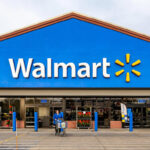President Donald Trump reignited his tariff feud with corporate America this weekend, calling out Walmart for blaming his trade policies for looming price hikes across its retail stores.
In a fiery post on Truth Social, Trump took direct aim at Walmart—the United States’ largest retailer—over its warning that tariffs imposed on imported goods would lead to increased prices on a wide range of consumer items, from bananas to baby car seats. The former president accused the retail giant of deflecting responsibility and demanded that the company absorb the added costs instead of passing them on to American consumers.
“Walmart made BILLIONS OF DOLLARS last year, far more than expected,” Trump posted. “Between Walmart and China they should, as is said, ‘EAT THE TARIFFS,’ and not charge valued customers ANYTHING. I’ll be watching, and so will your customers!!!”
Walmart Warns of Price Increases Amid Trade Pressures
Trump’s remarks came just days after Walmart CEO Doug McMillon addressed shareholders during the company’s Q1 earnings call. McMillon noted that even after recent reductions in tariffs, the remaining trade duties would still impact pricing. “Even at the reduced levels, the higher tariffs will result in higher prices,” he warned.
Walmart CFO John David Rainey added more context, estimating that certain imported products like $350 child car seats made in China could see price jumps of up to 29%—roughly $100 per unit.
“We’re wired to keep prices low, but there’s a limit to what we can bear, or any retailer for that matter,” Rainey said, expressing the balancing act retailers must perform between competitiveness and rising operational costs.
Tariffs and Retail Reality: A Political Flashpoint
As Trump campaigns to return to the White House in 2024, trade and tariffs remain central to his economic messaging. He argues that his hardline approach to foreign imports—especially from China, Mexico, and Canada—will ultimately benefit American manufacturing and job growth. However, industry leaders across retail and automotive sectors warn of the opposite: supply chain disruptions, higher production costs, and reduced consumer spending power.
The Trump administration previously levied tariffs as high as 145% on some Chinese imports, though that figure has recently been reduced to 30% for a 90-day grace period. In addition, he imposed import duties on steel, aluminum, autos, and pharmaceuticals, citing national security and domestic production goals. He also introduced tariffs on goods from Mexico and Canada, citing issues related to illegal immigration and drug trafficking.
Despite these actions, Trump has maintained that foreign producers—not American companies or shoppers—would bear the burden of tariffs. His latest attack on Walmart illustrates the political pressure he’s placing on companies to align with his economic vision, even if it comes at the expense of their profit margins.
Corporate Pushback and Supply Chain Stress
Walmart’s official response to Trump’s criticism was measured but firm. A spokesperson told CBS News that the company is committed to keeping prices low “for as long as we can given the reality of small retail margins.”
This isn’t the first time Trump has clashed with major corporations over the economic fallout of his policies. During his presidency and beyond, he has targeted Amazon, Apple, Ford, and General Motors, often accusing them of prioritizing profits over patriotism.
In April, Walmart’s CEO joined other retail executives in a private meeting at the White House to discuss the ramifications of tariffs. Despite their concerns, the administration pushed forward, leading to today’s standoff between political ideology and retail economics.
As the campaign season heats up and economic anxieties continue to climb, Trump’s call for Walmart to “eat the tariffs” may resonate with voters feeling the sting of higher prices—but it also puts American businesses in a complex bind.











